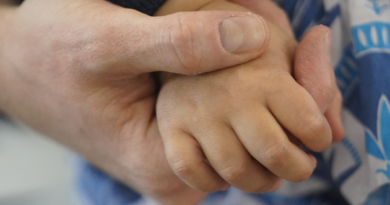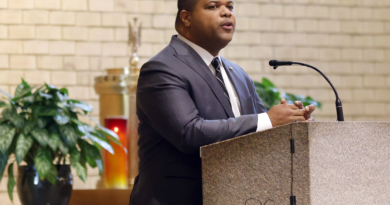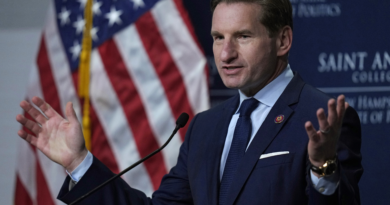Brandon Johnson sworn in as Chicago mayor
“There’s enough room for everyone in the city, whether you are seeking asylum” or are unhoused, he told the applauding crowd at the University of Illinois at Chicago Credit 1 Arena. “We don’t want the story of Chicago to be that we didn’t invest in all of our people.”
The real refrain of his speech, though, was “soul of Chicago,” which he used to address the importance of investing in underserved communities.
“The soul of Chicago tells us we will never close our doors to those who come here searching for a better life,” Johnson, the son of a pastor, said in a rousing 40-minute speech. “That has always been the soul of Chicago. And it will always be the soul of Chicago.”
The new mayor continued: “No one should be too poor to live in one of the richest cities in one of the richest countries in the world. … We can bring Chicago home, Chicago.”
“We don’t want our story to be that we are traumatized by violence … and that residents had no other choice than to leave,” he said. “That won’t be our story. Not on my watch.”
Johnson drew the wildest applause when he repeated his support for “treatment, not trauma,” a reference to his support for reopening public mental health facilities to work with the nonprofit facilities that the outgoing mayor, Lori Lightfoot, has backed. Her immediate predecessor, Rahm Emanuel, had closed the public health facilities, and the debate about reopening them or not fueled much of the political campaign.
Johnson took the oath after exchanging a handshake from Lightfoot, who drew wild applause when she welcomed the crowd “to a peaceful transfer of power.”
It was a reminder that even though Lightfoot lost her reelection bid, she and Johnson are united as Democrats.
Johnson wove humor into a speech that was an ode to Chicago, reminding people that he was one of 10 children and learned how to negotiate.
Along with picking up where Lightfoot left off in trying to tackle an escalating migrant crisis and persistent violence, Johnson will also have to figure out how to address the city’s steep pension problems.
Johnson was county board commissioner and a paid organizer for the Chicago Teachers Union before he ran for mayor. He and former public schools executive Paul Vallas edged out Lightfoot in the Feb. 28 election, and then Johnson beat Vallas in the April 4 runoff.
Johnson was backed by the CTU, which for a decade had tried to elevate a candidate who supported social justice issues to the mayor’s office. Members of the CTU and SEIU, which also lifted Johnson’s campaign, were in full force at Johnson’s swearing-in, even chanting unions’ names back and forth before the ceremony began.
Johnson also paid tribute to the 50 newly elected members of the Chicago City Council, which he must work with in order to promote his efforts to “invest in people.”
The Council’s Progressive Caucus has grown, giving Johnson a strong voting bloc in his administration. But its 20 members aren’t enough to make decisions outright, so he’ll have to work with all of the aldermen to get things done.
Johnson started the day with an “inauguration tour,” making stops on the city’s West Side before arriving at the UIC arena for the ceremony.
Later Monday afternoon, he will take part in a long-standing tradition of new Chicago mayors by greeting residents who will line up to congratulate him in City Hall.
Later Monday, Johnson will be feted at an invitation-only event for supporters, elected officials and community leaders called “The People’s Ball.”




